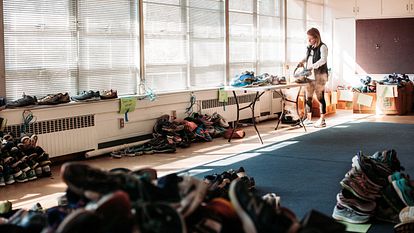How has cancer affected your outlook on life?
I was a very shy person before all of this. It’s amazing that once you have to show your body to strangers you don't know, or walk around in public with no hair or eyebrows, you start to open up a little more.
There was no guarantee I would still get to be here. People with the same type of cancer I had have relapsed and had stem cell transplants. It’s the random luck of the draw that it's been 19 years and I’ve hit remission. I look at that opportunity and I don’t want to waste it.
Even with bad ankles and the heart and lung damage I have from my cancer treatment, I appreciate every day. I’m a pretty relaxed and happy person. I don’t let things get me down. I won’t say that during COVID I haven’t had my moments. But I find my focus one step at a time and keep plugging along. That’s just kind of how I roll.









Join our Newsletter
Get deals, events, and more.
Connect with Fleet Feet
Get involved on social media.
Find a Location
Fleet Feet has over 250 locations nationwide!
Find a Store